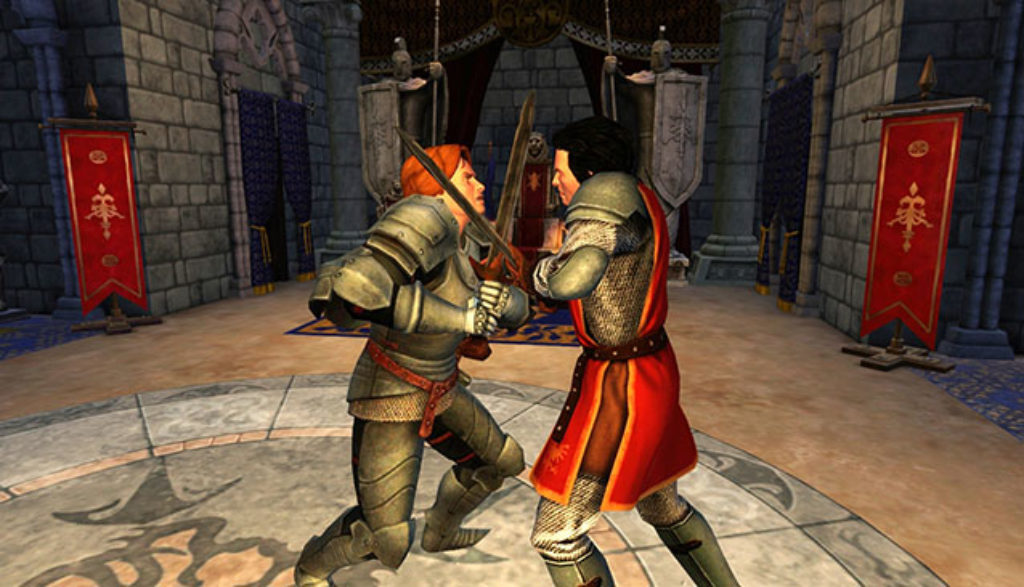
For 10 years now—whether on a PC, a gaming console or even on a touch screen smartphone—people have been having a blast playing god. Well, a small g digital homage anyway. With The Sims games, players wield the power to create little virtual people called sims, prod their lives to and fro, and watch what they do.
Is, then, this newest sim-er, with its king and castle cover, essentially just another expansion pack with a Renaissance Faire twist? No. The Sims Medieval is much more than that. This new build-a-hero experiment moves the action from a typical sim suburb and plunks gamers down in a Sims version of a quest-filled role-playing game.
New Halls and New Heroes
Play begins with a brief narration and gameplay tutorial that makes it crystal clear just how different things will be. Fear not though, fair gamer, you’ll still be in the character-creation biz. But the goal here isn’t to build families and watch them do their daily chores and attend to their various bodily needs. Instead, things begin with the building of a single male or female monarch whose job it is to govern and rule.
Regular miniquests of eating and resting, along with other scheduled kingly duties such as passing edicts or perhaps killing a rampaging bear, do more than just expand the family wardrobe here. You can actually better the entire kingdom when you choose to pursue one of 12 possible “ambitions” that interact with well-being, security, culture or knowledge, and eventually lead to “winning” the game.
For instance, a monarch may hear of a fearsome cave-dwelling Crab Monster that could very well be persuaded by new clothes, a little mustache wax and several well-prepared meals to help protect the realm. Voilà, you’re one step closer to a secure domain. And each finished quest opens the castle gate to several more, earning experience points that allow you to expand the kingdom. New prefab buildings and towers can be added—and no degrees in building are required this time around. Decorating with a new throne, a roaring fireplace or a few tapestries are about all the architectural dabbling you’ll be doing.
New buildings, however, bring with them the possibility of new heroes. Build a church, for instance, and you get a priest. Other structures let you create and control wizards, spies, blacksmiths, knights, merchants and bards. They’re all characters who nobly—or maybe not so nobly—serve the realm and help you fulfill your quests and finish your ambition.
The Clutter of the Choice
Like most RPGs, The Sims Medieval often offers several paths to a given quest’s fulfillment. One quest features a powerful hag of a witch who threatens the land, for instance. So do you prompt your hero to kill her? Steal her power? Or marry her (gulp!) and draw her to your cause? Also, each character you create, whether king or commoner, comes with two positive traits and a fatal flaw. So you might end up with a brave, valiant … compulsive gambler. Or a sincere, talented … drunkard. And if your sims are encouraged to nurture their negative yearnings, then the game will always supply ways to sate them.
You can end up, then, with options for free-flowing alcohol, swordfights ending in death, dark magic spell blasts, dens of gambling, flirting in the hopes of bedding members of either sex, and church clerics who are clearly less than godly fellows.
That sounds bad. And it is. But it’s only fair to say that it’s tempered and tamped down by the game’s approach. Characters communicate in a non-language sim speak, so obscenities are never a problem. Killings—from hunting bears to jousting monsters—all happen offscreen. And the swordfight encounters or pit monster battles are bloodless and generally approached with a detached, humorous slant. Spells are little more than glowing blasts from a wizard’s stick-like staff. Inebriation is overblown staggering and silliness. And sexual encounters are dubbed “woo-hoo” and kept totally under the covers.
What you do and what you see in The Sims Medieval has a lot to do with how you play. What you decide to toy with. What paths through the moral forest you decide to explore. That’s not to justify the mystical spirituality or casual sex that can go on. But it is to say that such negative elements aren’t approached in the same way or given as much clout as they are in many RPG peers.
I wish the game had taken one more step, though: It gives you credit for making good choices, but it doesn’t do the same when you avoid the bad ones. So you’re sort of on your own for that.

After spending more than two decades touring, directing, writing and producing for Christian theater and radio (most recently for Adventures in Odyssey, which he still contributes to), Bob joined the Plugged In staff to help us focus more heavily on video games. He is also one of our primary movie reviewers.